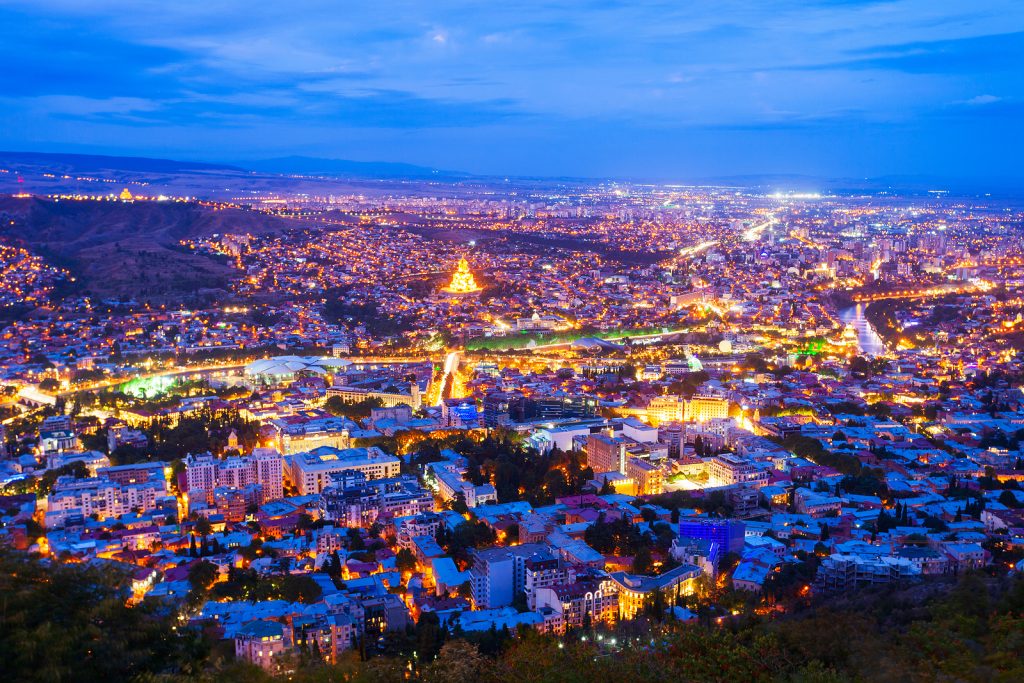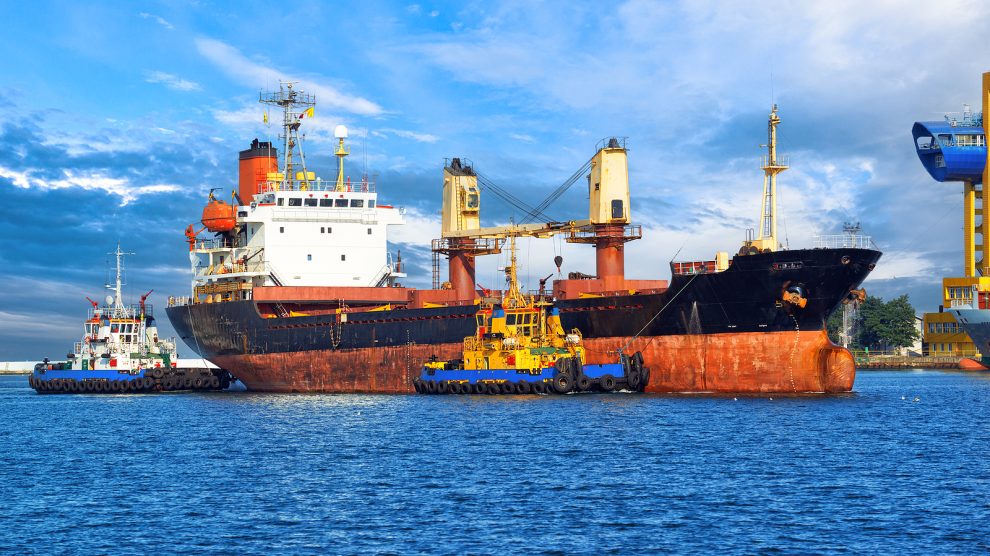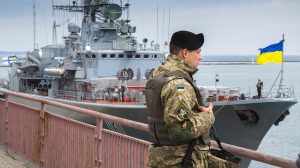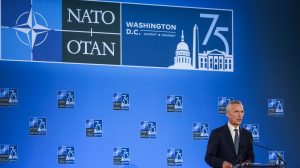Catch up quickly with the stories from Central and Eastern Europe that matter.
Russia’s war on Ukraine
At least one person was killed on Wednesday after a Russian missile struck a civilian ship entering the Ukrainian Black Sea port of Odesa, Ukrainian officials said.
According to the southern defence forces, the Liberian-flagged vessel was struck by an anti-radar missile. A 43-year-old harbour pilot died, while three Filipino crewmembers and a port worker have been injured. There was no immediate comment from Russia on the incident.
Vessels entering and leaving the port of Odesa have been at risk of Russian attack since Moscow pulled out of a deal earlier this year that allowed for the safe export of Ukrainian grain.
Ukraine has since opened a temporary corridor to allow vessels to come and go from its ports. The Russian defence ministry said it regards all cargo ships in the Black Sea bound for Ukraine as potential military targets.
The European Commission this week took the historic step of formally recommending to member states that they should open EU accession negotiations with Ukraine.
The Commission also said it recommended that the council adopt so-called negotiating frameworks for Ukraine once IT had adopted certain key measures.
Commission chief Ursula von der Leyen praised the country’s “excellent progress, even as it’s fighting an existential war,” saying Ukraine had completed “well over 90 per cent of the necessary reforms” that the EU set out last year, adding that “the goal is truly within reach”.
Ukrainian President Volodymyr Zelensky reacted to the Commission’s announcement by saying, “this is a strong and historic step that paves the way to a stronger EU with Ukraine as its member”.
Neighbouring Moldova was also given the same endorsement by the Commission, as was Bosnia and Herzegovina, although the latter must first implement a series of key outstanding reforms.
Russian state news agency RIA Novosti reported this week that the Kremlin is sending Ukrainian prisoners of war to the front lines of their homeland to fight on Moscow’s side in the war.
Experts say such actions would be an apparent violation of the Geneva Conventions relating to the treatment of prisoners of war, which forbids them from being exposed to combat or from working in unhealthy or dangerous conditions — coerced or not.
The Institute for the Study of War in Washington said there have been previous reports of Ukrainian prisoners of war being asked to “volunteer” for the battalion.
“Russian authorities might claim they are recruiting them on a voluntary basis but it’s hard to imagine a scenario where a prisoner of war’s decision could be taken truly voluntarily, given the situation of coercive custody,” said Yulia Gorbunova, senior researcher on Ukraine at Human Rights Watch.

Tbilisi, Georgia
Other news from the region
While Ukraine and Moldova were being recommended for EU accession talks, the European Commission this week declared that the EU grant Georgia candidate status, paving the way for the bloc to begin the country’s accession process at the EU Council meeting later in December. If the EU Council follows the recommendation, as expected, it would be a reversal of the bloc’s previous decision almost 17 months ago to deny Georgia candidate status—choosing instead to give its government 12 reform ‘priorities’—while granting it to Ukraine and Moldova.
An investigation by RFE/ Radio Liberty found Serbian companies are exporting to Russia dual-use goods—used for both military and civilian purposes—that have been targeted by Western sanctions. Despite a pledge by President Aleksandar Vučić that his country would not serve as a conduit for circumventing sanctions, customs records from international trade databases show that Serbian companies have shipped at least 71.1 million US dollars in sanctioned dual-use goods to Russia since it launched a full-scale invasion of Ukraine in February 2022.
China’s foreign ministry on Wednesday urged Estonia not to allow Taiwan to open any official organisations in the country, after the Chinese ambassador reportedly threatened to leave Estonia if Taiwan opens a representative office in the Baltic nation. Taiwanese Foreign Minister Joseph Wu visited the Estonia, Lithuania and Latvia this week, and Taiwan already has representative offices in Latvia and Lithuania. Estonia is also investigating whether a ship flying the Hong Kong flag was involved in recent man-made damage to undersea infrastructures between Estonia and Finland.
Also in Estonia, the country’s regional ministry this week announced that it was ending its free bus programme in order to finance the development of its public transport network. Estonia had been the first European country to introduce the free perk across nearly all of its territory back in 2018. Starting from January, “paid tickets for working age passengers will be introduced on county bus lines,” ministry spokeswoman Deisi Helemae-Sarv said. “Public transport is chronically underfunded and the system lacks the money for the development of the line network,.”
Italy this week announced it will build two migrant centres in Albania to house up to 3,000 people at a time, and capable of processing up to 36,000 migrants in a year. Under the deal, migrants who are intercepted by Italian navy or coast guard ships will not be taken to Italian soil will be transferred to Albania—although they can still claim asylum in Italy. Under the deal—the first of its kind for an EU member—centres will be governed under Italian jurisdiction, a point that has raised concerns about the extraterritorial application of Italian and EU law in a country outside of the 27-member bloc.
Slovakia’s new prime minister, Robert Fico, rejected a 43 million US dollar proposed package of military aid for Kyiv including rockets and ammunitions, fulfilling a campaign promise to end government military aid to Ukraine. However, he clarified that he will still allow the commercial sale of Slovakian ammunitions to Ukraine and greenlit European Council conclusions that included military aid for Ukraine. Fico and his far-left Smer party ran a campaign focused on promises to end military assistance, with Fico arguing that “the people in Slovakia have bigger problems.”
The Kremlin raked in an extra one billion euros for its war effort this year after Russia’s largest private oil firm, Lukoil, exploited loopholes in EU sanctions rules—with help from Bulgaria. Taking advantage of a unique exemption to the EU’s Russian oil ban, Bulgaria allowed millions of barrels of Russian oil to reach a local Russian-owned refinery, which then exported various refined fuels abroad including to EU countries. That loophole also generated almost 500 million euros in profits for the refinery’s owner Lukoil since the exemption kicked on February 5.
After several years of anti-Iran state propaganda, Tajikistan’s leader, Emomali Rahmon, warmly welcomed Iranian President Ebrahim Raisi to Dushanbe on Wednesday for the signing of agreements in areas including visa policies, transportation, drug control, free economic zones, long-term economic and trade cooperation, and research. Last week, after a decade of discussion, Saudi Arabia, Iran’s longtime rival, pledged a 100 million US dollars soft loan for Tajikistan’s ongoing effort to build its colossal Roghun hydropower dam—an announcement apparently hastened by Dushanbe’s restoration of ties with Tehran.
Unlike many news and information platforms, Emerging Europe is free to read, and always will be. There is no paywall here. We are independent, not affiliated with nor representing any political party or business organisation. We want the very best for emerging Europe, nothing more, nothing less. Your support will help us continue to spread the word about this amazing region.
You can contribute here. Thank you.







Add Comment